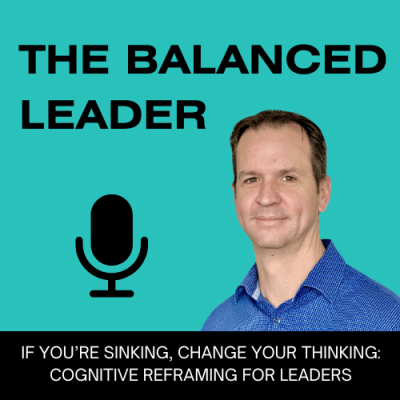In this episode of The Balanced Leader Podcast, I share a simple but powerful phrase that came home with my son one afternoon: “If you’re sinking, change your thinking.” At first, I thought it was just a helpful tool for him — but it quickly became something my wife and son were reminding me of when I slipped into negative thinking. And honestly, they were right. This saying might sound lighthearted, but it has incredible staying power when life or leadership feels overwhelming.
I explore how this phrase connects to real neuroscience and leadership research, and how reframing your thoughts can help you reduce burnout, recover faster, and lead with clarity. You’ll hear a relatable story of a leader spiraling into “doomsday thinking,” practical reframing tools you can use straight away, and even a little Stoic wisdom. If you’ve ever felt stuck in negative thought patterns, this episode will give you fresh strategies to notice it, shift it, and lead with greater resilience.
Chapters
0:07 Welcome to The Balanced Leader Podcast
0:54 The quote that stuck: If you’re sinking, change your thinking
2:10 A workplace example: Alex and the spiral of doomsday thinking
3:13 The neuroscience of reframing
4:36 Stoic wisdom said the same thing, but differently
4:53 Three practical tools to change your thinking
6:16 Final reflections: leadership is learning to swim

Welcome to The Balanced Leader Podcast, where we tackle the ultimate challenge for leaders, achieving peak performance without sacrificing your well-being. If you’re ready to lead with clarity, energy, and impact without burning out, then you’re in the right place. I’m Rob Hills, your Leadership and Wellbeing Coach. And in each episode, I’ll give you the insights, tools, and strategies that will enable you to thrive. So let’s dive into today’s episode.
Recently, my son came home from school, and he told me about something he’d learned from a presentation one of his teachers had given him. It was a simple quote, but designed to pull him out of a rut whenever he noticed his thoughts weren’t productive. The quote is, if you’re sinking, change your thinking. Now, because my son gets lost in his thoughts and tends to overthink things, I thought this was a great quote and something we could remind him of when he’s struggling with his thoughts. What I didn’t realise was that it was actually me whose thinking was thinking.
Over the coming weeks, it turns out it wasn’t my wife and I reminding my son to change his thinking as much as it was my son and wife reminding me of my negative thinking patterns. And let me tell you, it stings a little, but to be honest, they were right. The thing that I like about this saying is that it sticks. Yes. It might be a little bit childish, but it actually works to help notice when my thinking starts to spiral.
It’s simple, memorable, and, honestly, it’s a tool every leader could use when things feel heavy. So it got me to thinking, how often do we find ourselves in situations where our thoughts pull us down and make things worse? If you’re anything like me, maybe it’s more than you expected. And when I reflect on it, I’ve actually seen this a lot over the years in the workplace. Let me paint you a picture.
Imagine a leader named Alex. Alex is smart, committed, runs a great team. But whenever something goes wrong, like a project stalling or a client pushing back, Alex’s brain goes full doomsday mode. Instead of seeing the bump as temporary, Alex thinks things like, we’re failing. This is never gonna work.
Or everyone’s gonna blame me. In other words, Alex is sinking. Imagine that Alex remembers the phrase, if you’re sinking, change your thinking. Instead of spiralling, Alex pauses, breathes, and reframes. Okay.
This is just a challenge, not the end. What can I actually control right now? Or what’s one step forward? The storm doesn’t necessarily disappear, but Alex isn’t drowning anymore. He’s swimming.
And the more I look into this, the more I found this cute little saying is actually backed by neuroscience. Cognitive reframing is a well researched strategy in psychology. According to Aaron Beck, the father of cognitive behavioral therapy, the way we interpret events shapes our emotions and our actions. Leaders who reframe setbacks as challenges, not catastrophes, recover faster and lead better. Harvard Business Review reported that leaders who actively reframe negative thoughts reduce burnout risk by up to forty percent because their brain isn’t stuck in survival mode all the time.
And neuroscience tells us that when we’re stressed, the amygdala, the fear center of our brain, actually takes over. But reframing activates the prefrontal cortex, bringing executive function back online and helps us return to problem solving mode. So, yes, changing your thinking really can stop you from syncing. Now I’m not saying this is easy. Sometimes my wife and son repeat the phrase to me, and I just wanna say, “I’m not sinking, I’m strategically evaluating the downside”. But, usually within thirty seconds, I realise, yep, I’m sinking. And they’re right again.
If you want something a little bit more socially acceptable, here’s a quote from Epictetus, the stoic philosopher. It’s not what happens to you, but how you react to it that matters. That’s basically the 2,000 year old version of if you’re sinking, change your thinking.
But anyway, how can you actually use this? Here are three tools you can try. The first one is name it to tame it. When you notice yourself spiraling, literally say, I’m sinking.
Naming it gives you distance from the thought. Then choose one new perspective. What else could this mean? Generally, your brain is just serving up the easiest option it came up with, and you’re accepting it as fact. But if you push yourself, I guarantee you’re gonna see a different perspective.
Secondly is the ten, ten, ten rule. Ask yourself, will this matter in ten minutes, ten months, ten years? Maybe it will matter in ten minutes. It probably won’t matter in ten months, and in most cases, it definitely won’t matter in ten years. Suddenly, that missed deadline or awkward meeting doesn’t seem so catastrophic.
And the last tool is to swap the question. Instead of why is this happening to me, ask what can I learn from this? Life constantly seems to be serving me up opportunities to learn. Most of the times, I ignore them, but then life keeps serving up the same lesson in different forms until it finally gets through my thick skull. By changing the question, you’re changing your narrative, and it moves you from victim to problem solver.
So let’s bring this plane into land. We all sing sometimes. In fact, if you start using the saying, I guarantee you’re gonna notice how often you do it. Nobody’s immune. But when you catch yourself spiraling, remember, if you’re sinking, change your thinking.
Use the cognitive behavioral therapy tool called reframing to shift from downward spiral to what can I learn from this? Then notice the impact and test and adjust. This could be the tool that helps you become a more positive and effective leader. That’s it for today’s episode of The Balanced Leader podcast. If this little phrase sticks with you, and I hope that it does, share it with your team.
Because leadership isn’t about never sinking. It’s about learning how to swim through the challenges. And remember, if you’re sinking, change your thinking. I hope you enjoyed today’s episode, and I look forward to speaking with you next time.
